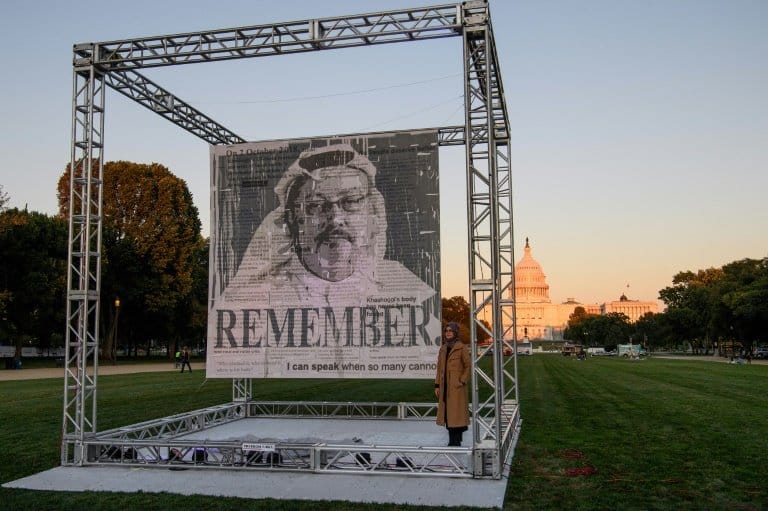Turkey seeks to shelve Khashoggi case

A Turkish prosecutor on Thursday asked an Istanbul court to halt the trial of 26 suspects in the murder of Saudi critic Jamal Khashoggi and hand the case over to Riyadh.
Turkey is seeking to mend ties with Saudi Arabia to bolster its struggling economy, four years after the gruesome 2018 killing of the dissident Saudi journalist inside Riyadh’s consulate in Istanbul.
The Istanbul court is trying 26 Saudi officials in absentia over the macabre killing but the prosecutor said the trial should be stopped and the case transferred to Saudi Arabia, at the latter’s request.
Khashoggi’s Turkish fiancee confirmed the Saudi government had asked to take over the case in Istanbul.
“The prosecutor asked, accordingly to the Saudi demand, for the transfer of the file to #SaudiArabia and the finalisation of it in #Turkey,” Hatice Cengiz tweeted after the hearing on Thursday in Istanbul’s main court.
She said the court would seek the opinion of the Turkish justice ministry.
Private news agency DHA said the prosecutor defended his position by arguing that the trial had run into the sand “because the court orders cannot be executed on the grounds that the suspects are foreign nationals”.
On October 2, 2018, 59-year-old Khashoggi, a US-based journalist with The Washington Post, entered the Saudi consulate in Istanbul to file paperwork to marry Cengiz.
According to US and Turkish officials, a waiting Saudi hit squad strangled him and dismembered his body, which has never been retrieved.
– ‘Terrible news’-
RSF said the motive for shelving the investigation into the murder appeared to be political.
“The Khashoggi file appears this time to be a victim of diplomatic rapprochement between Turkey and the (Saudi) kingdom,” RSF’s representative in Turkey, Erol Onderoglu, told AFP.
The rights group said the Saudi’s had asked “on March 13” to take over the case.

Western intelligence agencies accuse Saudi Crown Prince Mohammed bin Salman of authorising the murder / © SPA/AFP
The journalist’s murder sparked international outrage that continues to reverberate, with Western intelligence agencies accusing Saudi Crown Prince Mohammed bin Salman, the kingdom’s de facto ruler, of authorising the killing.
The crown prince has said he accepts Saudi Arabia’s overall responsibility for Khashoggi’s death but denies a personal link. Riyadh insists it was the doing of agents who had gone “rogue”.
Turkish President Recep Tayyip Erdogan said at the time that the order to kill “came from the highest levels” of the Saudi government, without pointing the finger of blame at the crown prince.
Saudi Arabia jailed eight people over the killing. But Turkey was unconvinced by the closed-door proceedings and put 26 Saudis on trial in absentia, including two who are close to the crown prince.
– ‘Insist on justice’-
In an interview with AFP in February, Cengiz said Turkey must keep insisting on justice for Khashoggi “even if it improves its relations” with Riyadh.
“I don’t think it’s in anyone’s best interest to shut it down completely.”
Asked if she was disappointed, Cengiz said: “If we look at it from the viewpoint of realpolitik, (Turkey’s position) did not let me down,” adding that countries were “not ruled by emotions” but “mutual interests”.
But she added: “Emotionally speaking, of course, I am sad.

Countries are ruled by ‘mutual interests’, says Khashoggi’s fiancee / © AFP
“Not because my country has made peace with Saudi Arabia and that this issue is closing, but ultimately, no matter how fiercely we defended it, on a national basis, on a state basis, on a president basis … now everything is starting to go back to the way it was, as if nothing had happened. I am inevitably disappointed about this.”
Turkey, which is reeling from a fresh economic crisis and is searching for foreign investment and trade, has reached out to regional rivals including Saudi Arabia and the United Arab Emirates.
Foreign Minister Mevlut Cavusoglu said in a televised interview on Thursday that some “concrete steps” would be taken to normalise relations.
Erdogan said in January he was planning a visit to Riyadh — which would come at a critical moment for Turkey, where inflation is surging to over 50 percent.
The next hearing in the trial is scheduled for April 7.





